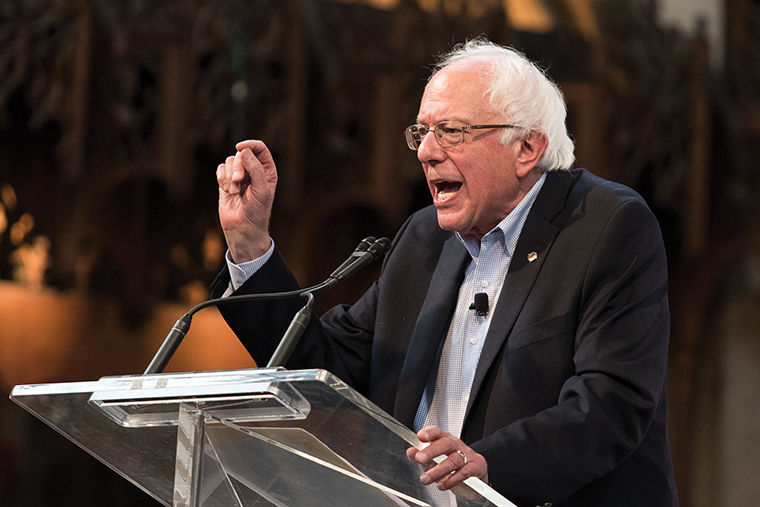University of Chicago feels the ‘Bern’
Democratic presidential hopeful Bernie Sanders, a graduate of the University of Chicago, spoke to supporters inside the university’s Rockefeller Chapel on Sept. 28.
October 5, 2015
StuDents sitting in the pews of the University of Chicago’s Rockefeller Chapel at 5850 S. Woodlawn Ave. roared as Democratic presidential candidate Bernie Sanders encouraged young potential voters to be the change America needs to succeed. Sanders, who graduated from the U of C in 1964, returned to his alma mater Sept. 28 as a stop on his campaign trail to discuss a range of issues including women’s rights, conquering racial inequality and transforming the political system he says is corrupted by wealth. “Change never takes place from the top down,” Sanders said. “It always takes place from the bottom on up.” David Axelrod, director of the Institute of Politics at the university introduced the candidate by sharing how Sanders led the university’s first civil rights sit-in to protest segregation in student housing and eventually made his way to serving eight terms in the House of Representatives before being elected into the United States Senate in 2006, where he has served ever since. “Throughout the years, he’s been a consistent, progressive voice,” Axelrod said. Discussing women’s rights, Sanders said there were fewer women in medical and law school when he was attending U of C in 1964 than there are today. He said he thinks progress has been made toward women’s rights, but America “still has some work to do” because he thinks women are not yet in charge of their own bodies. “But we made progress,” Sanders said. “Women and their male allies stood up and said, ‘We’re not going to allow women to be second-class citizens in the United States of America.’ That’s how change takes place.” Sanders also addressed the issue of hourly wages for women, who make 79 cents compared to every dollar men get paid. That amount is substantially less for women of color, Sanders said. If elected president, Sanders said he would seek to pass legislation for equal pay for the same work. Sanders added that progress has been made toward eliminating discriminatory issues such as racial inequalities and same-sex marriage, but “we still have a long way to go.” “There are major issues that confront us today, and we need your help,” Sanders said. “We need the idealism and the energy and the intelligence of millions of young people to join us in the fight to make America the kind of country we know it must become.” Sanders said campaign finance reform is important to him because it affects every other issue. He has said previously during other stops on his campaign trail that he would introduce legislation to move toward public funding for elections, allowing more Americans to participate in them. “The foundations of American democracy are being undermined,” Sanders said. “It’s not supposed to be about billionaires
buying elections.” Sanders stressed the importance of young people voting. He said that in the 2014 election, 80 percent of people ages 18–29 did not vote, and 63 percent of all eligible citizens did not vote at all. “I want you to be able to run for office without having to beg billionaires for campaign contributions,” Sanders said. Other issues Sanders touched on included raising the minimum wage to $15 an hour nationally, universal health care, combating climate change and prison reform. Following a 30-minute speech, Sanders opened the gathering to a Q&A with the audience. One student asked how Sanders would push through his progressive agenda with a
divided congress. “The president is a personal friend of mine, and we’ve worked on a lot of issues,” Sanders said. “The Republicans may say to me, ‘Sorry, Mr. President, we don’t see eye to eye on those issues.’ So what do we do? No one can implement the changes we need in this country without a
political revolution.” Sanders stressed the importance of challenging the status quo to create change. He added that if people outside of Congress demanded that issues like climate change be addressed, the political system could be able to transform. “I would hope all of you are prepared to think big, not small,” Sanders said. “When we stand together, when we do not allow demagogues to divide us up—whether we’re white, black or Hispanic, born in this country or abroad, straight or gay or men or women—when we stand together, we can accomplish
extraordinary things.” Jaclyn Jermyn, a senior journalism major who attended the event, said it affirmed her political beliefs in support of Sanders. “Having a major political candidate say the things you’ve been thinking for a long time is an amazing experience,” Jermyn said. “It made me want to support him even more and contribute to the campaign any way I can.” Sanders has many young supporters, but not all of them think he is fit to run for president. Amanda Arndt, a freshman fashion studies major, said she thinks Hillary Clinton would be a better fit. “Hillary has a lot of experience,”Arndt said. “I think age does make a difference. I think Bernie is a little too old to understand the issues facing younger people today. As a woman, Hillary understands women’s issues more than Bernie does.”








